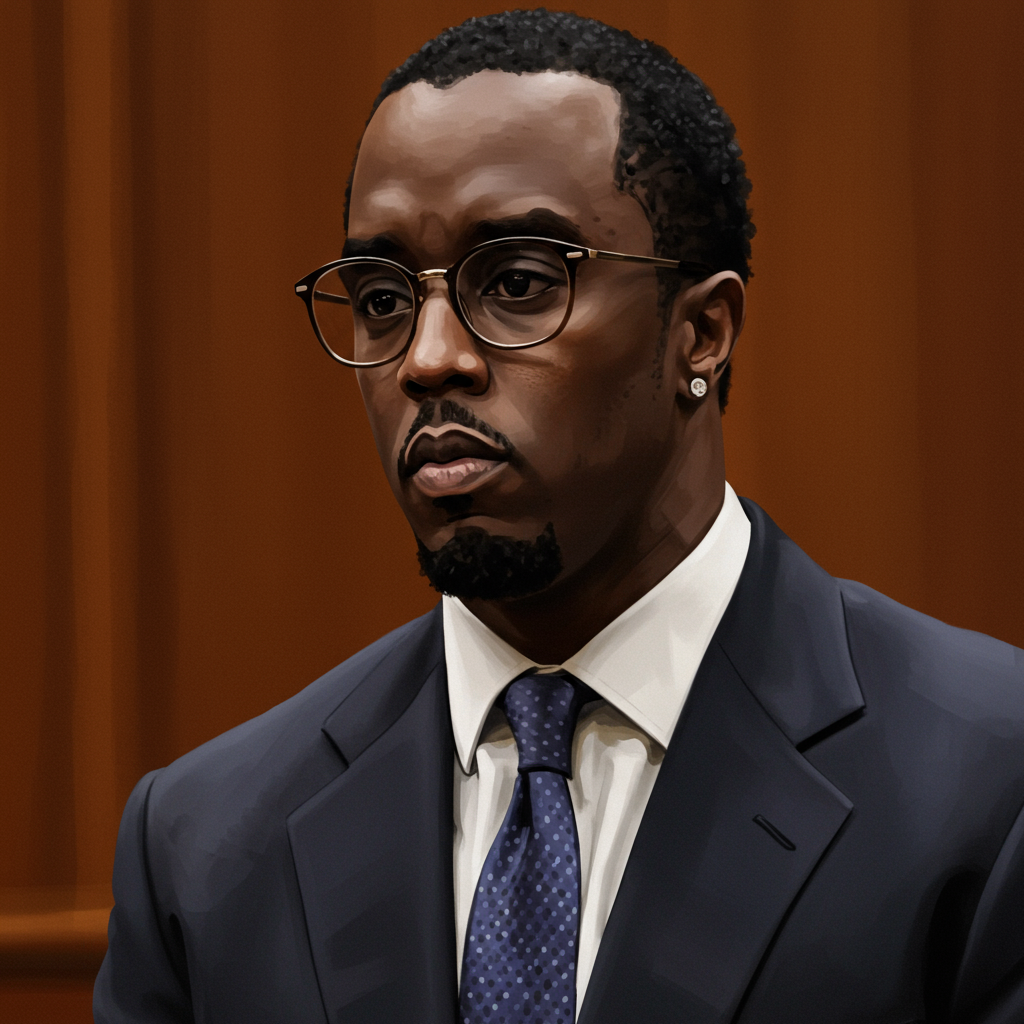The high-profile federal trial of music mogul Sean “Diddy” combs has reached a pivotal moment. Jurors in New York are preparing to begin deliberations on Monday. They must decide whether Combs, aged 55, is guilty of serious sex trafficking and racketeering conspiracy charges. This followed intense closing arguments last week, where prosecutors and the defense presented drastically different views of the evidence and Combs’ actions over two decades.
Combs maintains his plea of not guilty. The trial has captured significant attention, highlighting explosive allegations and contrasting legal strategies. The fate of the founder of Bad Boy Entertainment now rests with the jury after weeks of testimony and the final impassioned pleas from opposing counsel.
Prosecution: A Criminal Enterprise Leader
Prosecutors portrayed Sean Combs as the head of a criminal enterprise. They argued he used his fame, wealth, and power to commit crimes for 20 years. Assistant U.S. Attorney Christy Slavik described Combs as a man who “doesn’t take no for an answer.” The government insisted he coerced, threatened, and violently forced two former girlfriends into sexual acts. these acts allegedly included having sex with male sex workers to fulfill his own desires. Prosecutors cited multiple violent incidents as proof the women were not consenting. They argued these acts demonstrated the women had “no say.”
During closings, Slavik surprisingly gave prominence to allegations prosecutors had seemed to step back from earlier. Despite removing instructions on arson and kidnapping theories for the jury, she named them first in her closing remarks. She stated Combs was the leader of an enterprise involved in various crimes. These included kidnapping an employee, attempting arson by trying to blow up a car, forced labor (including sexual assault of an employee), and bribing a security officer to hide evidence. The core charges of brutal sex trafficking were also central to her argument.
The alleged arson related to rapper Kid Cudi’s car in 2012. The kidnapping claim involved a Combs employee allegedly forced to join him. This was said to happen when Combs broke into Kid Cudi’s home. He reportedly did this after learning Cudi was dating his girlfriend at the time. Prosecutors argued “overwhelming evidence proves his guilt.” They called on the jury to “hold him accountable.”
Defense: Targeting and Overreach
The defense team, led by attorney Marc Agnifilo, launched a forceful counter-argument. Agnifilo characterized the government’s case as extreme overreach. He called it an unjust targeting of a highly successful Black entrepreneur. He mocked the evidence seized by investigators. Hundreds of agents searched Combs’ residences in Miami and Los Angeles. They reportedly seized hundreds of bottles of baby oil and Astroglide lubricant.
Agnifilo sarcastically questioned the value of this evidence. He suggested investigators found nothing substantial regarding criminal business activities. He argued the entire prosecution stemmed from a lawsuit filed by former girlfriend Casandra “Cassie” Ventura in November 2023. Ventura sued Combs with allegations of abuse. The lawsuit settled the next day for $20 million. However, it triggered the criminal probe that led to the current trial.
The defense attorney argued the government was trying to criminalize a “swinger lifestyle.” He claimed Combs and his girlfriends engaged in this consensually. He warned that this novel approach to sex crimes risked turning private sexual activities into potential crimes for all Americans. Agnifilo suggested Combs making “homemade porn” with girlfriends was “sort of typical.” He doubted Combs was “the only man in America making homemade porn.”
He portrayed the investigation as an invasion of Combs’ most private life. He used the analogy of yellow crime scene tape wrapped around bedrooms and hotel rooms. Agnifilo even referenced the movie “Jaws,” suggesting they would “need a bigger roll of crime scene tape.” He argued the government “targeted” Combs. He noted investigators began their work right after Cassie’s lawsuit, not based on prior complaints.
Key Testimony and Allegations Detailed
The trial featured extensive testimony regarding the alleged acts. Cassie Ventura testified for four days. She described a decade of alleged abuse. Her allegations included being forced into hundreds of drug-fueled “freak-offs.” She claimed she was forced to perform sexually for days with male sex workers. She alleged Combs watched, filmed, and directed these encounters.
Another former girlfriend, testifying under the pseudonym “Jane,” gave six days of testimony. She claimed she experienced similar “hotel nights” or “freak-offs.” These allegedly occurred during her relationship with Combs from 2021 until his arrest. She claimed Combs provided her drugs and compelled her participation.
Other witnesses supported the prosecution’s narrative. These included a makeup artist and a male escort who testified about witnessing violence. Ventura’s mother testified about taking out a home equity loan after alleged blackmail by Combs. Kid Cudi recounted being told Combs broke into his home. He also suspected Combs was behind a car firebombing, potentially linked to his relationship with Ventura. A former best friend of Ventura also testified. She described pleading with Cassie to leave what she called a toxic relationship. Prosecutors argued these incidents were “tools the defendant used to control Cassie and Jane.” They rejected the defense’s portrayal of Combs’ relationship with Ventura as a “great modern love story.” Instead, they argued it was about a world where “no’ was never an option.” The prosecution specifically highlighted an alleged violent incident with “Jane” in June 2024 as a “clear cut” example of sex trafficking.
Judicial Instruction and Rebuttal
After the defense’s closing argument, Assistant U.S. Attorney Christy Slavik expressed outrage over Agnifilo’s claim that the government targeted Combs. When the jury returned, Judge Arun Subramanian addressed the issue. He instructed jurors that the government’s decision to investigate or indict an individual is “none of your concern.” This marked the judge’s intervention on a point raised by the defense.
Assistant U.S. Attorney Maurene Comey delivered the prosecution’s rebuttal. She forcefully countered the defense’s claims. She dismissed the defense suggestion that the women “wanted” to participate in the “freak-offs.” She described these explicit sessions as prolonged and uncomfortable, arguing they could not logically be considered consensual, especially for someone like Cassie Ventura. Comey rejected the defense’s characterization of sex tapes shown as “date nights.” She called them repetitive “performances” for Combs’ enjoyment.
Comey also addressed the defense’s assertion of no evidence for a prostitution charge. She argued Combs flew men across the country. He engaged in sexual acts in front of them and paid them. This, she implied, suggested payment for sex. She stated, “The defendant is not a god.” This referenced a former personal assistant who allegedly described Combs as a “god among men.” Comey asserted Combs thought he “was untouchable.” She claimed he had “gotten away with his crimes” for 20 years. “That ends in this courtroom,” she declared. She concluded by stating, “Overwhelming evidence proves his guilt.” She called on the jury to find him guilty.
The Path to a Verdict: Predicate Acts
For the jury to find Sean Combs guilty of the racketeering conspiracy charge, they must unanimously agree. They must find that the pattern of racketeering activity involved at least two specific “predicate acts.” Federal prosecutors have presented the jury with 10 possible acts they can consider.
These potential predicate acts include:
Kidnapping
Aiding and abetting kidnapping
Conspiracy to commit kidnapping
Transportation for purposes of prostitution
Arson
Aiding and abetting arson
Conspiracy to commit arson
Bribery
Witness tampering
Forced labor
Sex trafficking
Distributing controlled substances
Testimony presented during the trial included details related to several of these acts. Kid Cudi’s testimony touched on arson. Testimony from former employee Capricorn Clark related to kidnapping allegations. While some initial theories like attempted kidnapping and attempted arson were streamlined out, the remaining acts listed above are available for the jury’s consideration.
The defense argued there was a “gaping lack of evidence.” They claimed there was no proof supporting the existence of a criminal enterprise run by Combs. They conceded that his relationships sometimes involved domestic violence. However, they firmly denied that this amounted to sex trafficking.
Frequently Asked Questions
What charges is Sean ‘Diddy’ Combs facing in this trial?
Sean “Diddy” Combs is currently on trial facing federal charges. These include sex trafficking by force and transportation to engage in prostitution. He is also charged with racketeering conspiracy. Combs has pleaded not guilty to all charges presented in the case.
How did the prosecution and defense differ in their closing arguments?
The prosecution argued Combs led a criminal enterprise. They claimed he used coercion, violence, and threats over decades to force women into sexual acts, including with male sex workers. The defense countered that the prosecution was overreaching and unfairly targeting Combs. They argued the alleged activities were part of a consensual “swinger lifestyle.” They claimed there was insufficient evidence of a criminal enterprise or sex trafficking.
What key allegations were discussed during the closing arguments in the Diddy trial?
During closing arguments, prosecutors highlighted various alleged crimes. These included sex trafficking, forced labor, bribery, kidnapping (involving an employee), and arson (related to rapper Kid Cudi’s car). The defense sought to dismiss or redefine these actions, arguing they did not constitute federal crimes or were part of a private, consensual lifestyle being unfairly scrutinized.
The jury’s deliberation begins on Monday. This marks the critical final stage of the trial. They must weigh the competing narratives presented in the closing arguments. The serious federal charges, particularly racketeering conspiracy with its potential life sentence, underscore the high stakes of the verdict.



